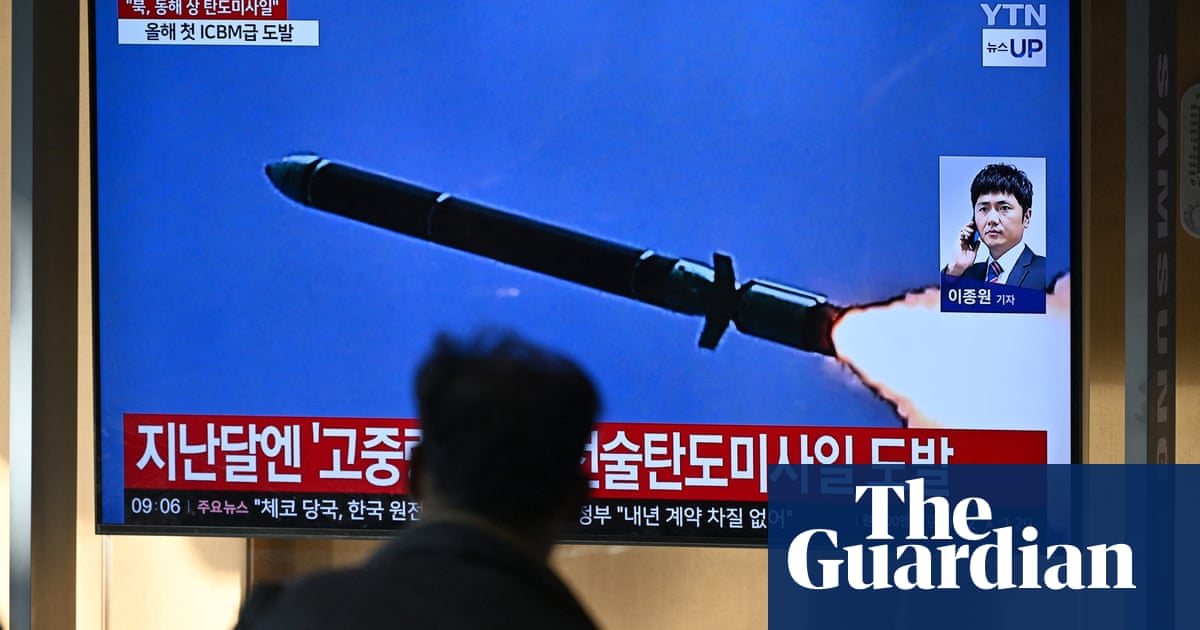North Korea has test launched a long-range missile that is theoretically capable of striking the US mainland, in another display of defiance by the regime amid growing warnings over its troops’ participation in the war in Ukraine.
US officials said they believed Thursday’s launch was that of an intercontinental ballistic missile [ICBM] but did not say how they had reached that assessment. Japan’s defence minister, Gen Nakatani, said the missile had flown higher and for longer than others tested by North Korea.
The North Korean leader, Kim Jong-un, said the regime had taken “appropriate military action”, adding that the US and its allies in the region had escalated tensions and “posed a threat” to the security of his country, according to the state-run KCNA news agency.
Kim, who was reportedly present at the launch, said the North would continue to bolster its nuclear arsenal, KCNA added.
South Korea’s Yonhap news agency, citing the country’s military, said the US was preparing to deploy “strategic assets” – usually a reference to conventional and nuclear capabilities – in response to the missile test.
South Korea’s government announced new export controls on materials needed to produce solid-fuel missiles – which are superior to those that use liquid fuel – to restrict the North’s ability to develop the weapons, the foreign ministry in Seoul said in a statement. The controls will cover 15 items that North Korea struggles to produce on its own, including fuselages and combustion tubes.
Little is known about the type of missile involved in Thursday’s launch. Japan’s government said it reached a maximum altitude of more than 7,000 km – a record height – and flew for an unprecedented one hour and 26 minutes.
The North, which last tested an ICBM almost a year ago, deliberately launches long-range missiles at a steep trajectory to avoid neighbouring countries.
Japan’s defence ministry said it believed the missile had fallen at about 8.36am outside Japan’s exclusive economic zone. The missile was launched from a site near the North Korean capital Pyongyang at 7.10am on Thursday and splashed down about 300km west of Hokkaido’s Okushiri island. Japanese officials said there had been no reports of damage or casualties.
US national security council spokesperson Sean Savett said the launch proved that North Korea “continues to prioritise its unlawful weapons of mass destruction and ballistic missile programmes over the wellbeing of its people,” adding that Washington would work to ensure the security of the American homeland and its allies South Korea and Japan.
If confirmed, Thursday’s test would be North Korea’s first of an ICBM since December 2023, when it launched the solid-fuelled Hwasong-18. Missiles with built-in solid propellants are easier to move and hide, and can be launched quicker than liquid-propellant weapons.
South Korea’s military intelligence warned MPs on Wednesday that the North was preparing to test a missile designed to reach the US. It said the regime may have completed preparations for its seventh nuclear weapons test.
Experts believe North Korea possesses short-range nuclear missiles that can strike South Korea, but are sceptical of Pyongyang’s claims that it is able to strike more distant targets using missiles tipped with miniaturised nuclear warheads.
Thursday’s launch came less than a week before American voters go to the polls to elect a new president. North Korea has used missile launches and other provocations to draw attention to itself in the run-up to elections and anniversaries in the US.
Kim Jong-un has also been encouraged to step up his weapons programme by the war in Ukraine. About 10,000 North Korean troops are thought to have been sent to Russia in preparation for possible deployment in Ukraine. On Wednesday, South Korea said more than 3,000 had been moved close to battlefields in western Russia.
Pyongyang is already supplying Russian forces with ammunition and missiles as part of a mutual defence pact agreed this summer between Kim and the Russian president, Vladimir Putin.
This week defence chiefs in the US and South Korea urged North Korea to withdraw its troops from Russia, while the US’s envoy to the UN, Robert Wood, warned that North Korean soldiers entering Ukraine would “surely return in body bags”.

